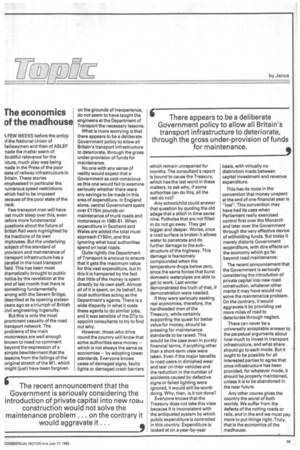There appears to be a deliberate Government policy to allow
Page 45

If you've noticed an error in this article please click here to report it so we can fix it.
all Britain's transport infrastructure to deteriorate, through the gross under-provision of funds for maintenance.
which remain unrepaired for months. The consultant's report is bound to cause the Treasury, which has the last word in these matters, to ask why, if some authorites can do this, all the rest do not?
Any schoolchild could answer that question by quoting the old adage that a stitch in time saves nine. Potholes that are not filled in do not go away. They get bigger and deeper. Worse, once a road surface is broken it allows water to penetrate and do further damage to the substructure of the highway. This damage is fearsomely compounded when the temperature drops below zero, since the same forces that burst domestic waterpipes are able to get to work. Last winter demonstrated the truth of that, if demonstration were needed.
If they were seriously seeking real economies, therefore, the hardheaded men of the Treasury, while certainly supporting the quest for better value for money, should be pressing for maintenance standards to be raised. This would be the case even in purely financial terms, if anything other than a short-term view were taken. Even if the major benefits to road users in dimished wear and tear on their vehicles and the reduction in the number of accidents caused by defective signs or failed lighting were ignored, it would still be worth doing. Why, then, is it not done?
Everyone knows that the Treasury does not take this view because it is inconsistent with the antiquated system by which public expenditure is controlled in this country. Expenditure is looked at on a year-by-year basis, with virtually no distinction made between capital investment and revenue expenditure.
This has its roots in the convention that money unspent at the end of one financial year is "lost". This convention may have had its uses when Parliament really exercised control first over the Monarch and later over the Government through the very effective device of witholding funds. But today it merely distorts Government expenditure, with dire effects on the economy which go far beyond road maintenance.
The recent announcement that the Government is seriously considering the introdution of private capital into new road construction, whatever other merits it may have would not solve the maintenance problem. On the contrary, it would aggravate it by providing yet more miles of road to deteriorate through neglect.
There can never be a universally acceptable answer to the perpetual arguments about how much to invest in transport infrastructure, and what share should go to each mode. But it ought to be possible for all interested parties to agree that once infrastructure has been provided, for whatever mode, it should be properly maintained, unless it is to be abandoned in the near future.
Any other course gives the country the worst of both worlds. We suffer from the defects of the rotting roads or rails, and in the end we must pay more to put things right. Truly, that is the economics of the madhouse.
















































